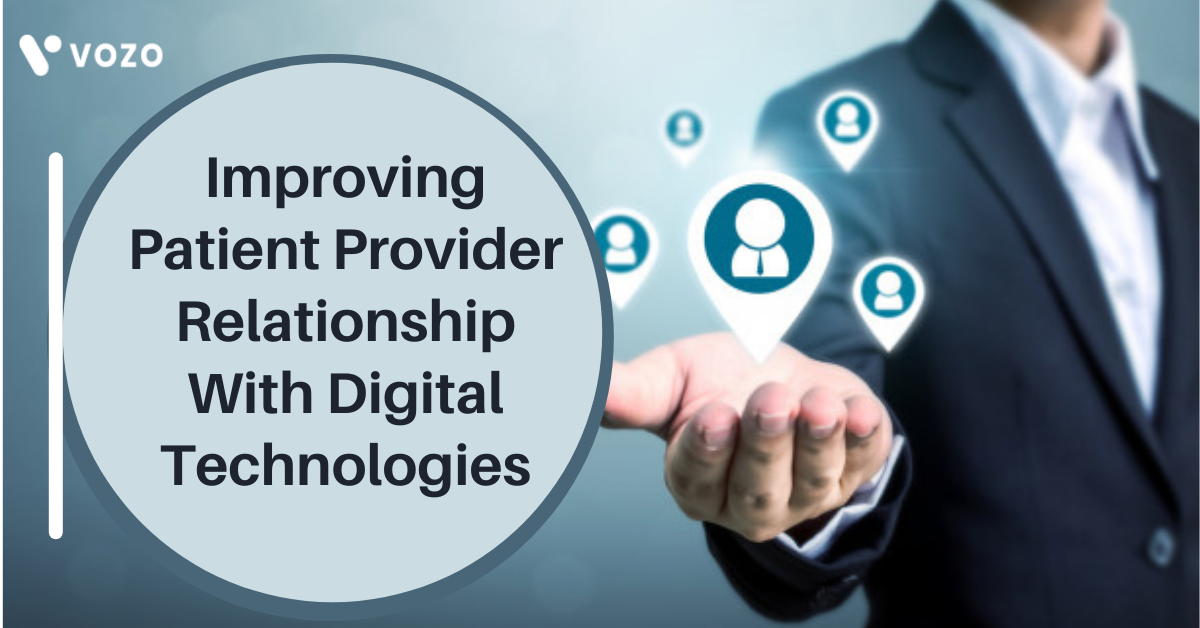Improving Patient-Provider Relationship With Digital Technologies
Technology has been changing healthcare and with new technological advancements like EHR, personal health records, telehealth patients can easily gain healthcare access on time.
Hence, identifying the patient’s needs and then implementing the right kind of healthcare management software that can satisfy patient experience is the need of future healthcare. This blog will explore some of the ways to do so successfully.
Identifying The Patient Needs
The fundamental step needed to improve the patient and provider relationship is by first identifying the expectations of a patient when they visit a hospital. Patients these days are proactive in directing their care.
They lookout for a hospital that offers a personalized experience and delivers advanced diagnoses and treatments. Here are some of the things that modern-day patients ask from their medical facility.
On-Time Appointments
Gone are the days when patients used to patiently sit and wait for their turns in the waiting rooms. Time is given the biggest regard today, and patients do not want to lose their precious time just by waiting in a room. Patients need a more systematic way of getting appointments by calling or with the use of digital apps.
Besides, telehealth applications have become highly prevalent nowadays. It allows people to get treated in the comfort of sitting at their homes and discussing their medical issues with a physician through a video call.
History of Patient’s Medical Records
Another crucial requirement of the patient from modern medical facilities is the storage of their complete medical records. Hospital software such as EHR (Electronic Health Record) is well-efficient in storing the medical history of the patients.
Patients require such software from their medical clinics so that they do not have to unnecessarily carry their medical records every time they visit the hospital. Having EHR software is also useful in saving a substantial amount of doctor’s time.
Predictive Diagnosis and Analysis
The technology has moved leaps ahead in diagnosing patient problems. There are many healthcare management software available that streamline the hospital’s daily operations and are extremely helpful in delivering accurate diagnostics.
Based on the data present in the EHR of the patient, the software analyses the information and builds insightful data. This data can be used to identify premature diseases and other complications at a ground level inside the human body. Any hospital providing this feature to their patients will indeed witness higher growth levels than their competitors.
RELATED: 6 Pro Practice Management Software Features: Top Tools In 2021
Quality Care and Treatment
Above all, quality is one of the major deciding factors for a patient choosing a hospital. If a hospital has maintained a high level of quality in its services and provides the same level of treatment, patients will invariably choose it over any other hospital.
The patient’s experience from the basic touchpoint of getting an appointment to the treatment and to further follow-up should be seamless. Only when the hospital will build a connected and cohesive experience for its patient will they show their loyalty towards the hospital.
Affordability
Implementation of modern technologies that can provide improved patient care and streamlined services is essential for healthcare institutions. However, they must ensure that their services must remain affordable for the common people after implementing these technologies. However good your services may be, patients will only come to your medical facility if they find it affordable.
Strategies To Improve Patient-Provider Interactions
Once you have identified your patient’s needs, you can plan your strategy for improving the patient-physician relationship. Some of the steps for doing so are stated down below:
Personalize The Patient Experience
Technology offers several tools and digital equipment that the patient can wear in their daily routine to monitor their health. Leveraging those tools, the patient can be given follow-up suggestions, home care plans, and even personalized appointment reminders.
The use of artificial intelligence in modern medicine has been significant. It can predict patient outcomes based on their medical history, which can further recommend the course of action required for the patient.
As more hospital software will make use of such technology, patient behavior can be studied as a whole. It will highly improve the delivery of care and the patient’s experience regarding the hospital.
RELATED: Redefine Your Patient Experience With 7 Quick Ways
Create Patient Communities
To meet the expectation of healthcare consumers of today, hospitals need technology that is easily accessible and has a collaborative nature. Cloud storage is a great example that signifies how all data of a consumer can be consolidated in a single place and can be accessed from anywhere.
Similarly, healthcare systems must have the required technology to integrate all the medical history of the patient in their software which can be accessed from anywhere. There is various hospital management software that uses API (Application Programming Interface) and cloud-based systems to create central hubs where both physician and patient can interact and share their data.
Also, these hubs or the platform offer to build a community of alike-diseased patients. It helps patients discuss their problems, read disease-related blogs, and find things that can improve their condition.
Conclusion
Improving the patient-physician relationship is vital, with or without the technology. However, in this high paced world, the use of technology makes achieving it much easier. So, implement the right technologies and healthcare IT solutions that encourage quality care, seamless patient experience, and keep people engaged in coming back to your hospital on the occurrence of a medical issue.
Vozo practice management software is one of the best healthcare software that can seamlessly help you achieve all your practice goals along with a better patient-provider relationship.
About the author

With more than 4 years of experience in the dynamic healthcare technology landscape, Sid specializes in crafting compelling content on topics including EHR/EMR, patient portals, healthcare automation, remote patient monitoring, and health information exchange. His expertise lies in translating cutting-edge innovations and intricate topics into engaging narratives that resonate with diverse audiences.













